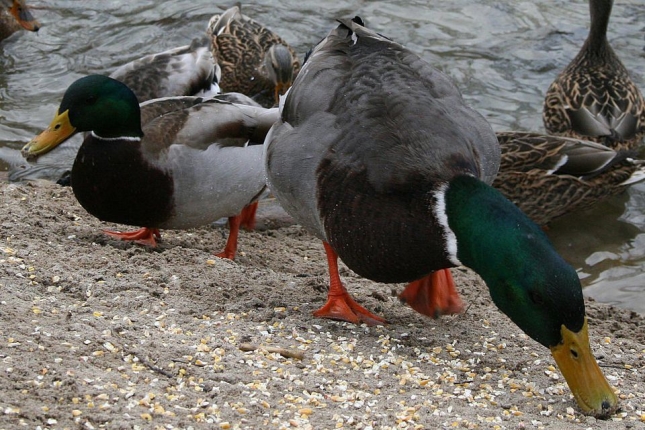What to Feed Ducks by Melissa Mayntz

Many birders got their first personal interactions with birds by feeding ducks at local parks or urban ponds. Knowing what to feed ducks can help provide the birds with a healthy diet so future generations can enjoy this activity safely both for themselves and for the birds they want to feed.
To Feed or Not to Feed Wild Ducks
Feeding ducks, geese, swans and other waterfowl is a topic of great debate among birders, conservationists and city officials. There are many bird feeding myths related to ducks, including the idea that feeding the birds will inhibit their migration. In fact, many waterfowl species are naturally year-round residents of city parks and similar habitats, and they will remain there whether or not they are hand fed. Too much feeding, however, is unhealthy and can create excess waste and pollution that can destroy habitats, while leftover, uneaten food can attract rodents and spread diseases. It is important to realize that waterfowl are capable of fending for themselves and do not require human handouts to survive, no matter what the season nor how much they seem to beg for treats. Individuals who do want to feed the ducks, however, can do so by offering nutritious treats to supplement the birds’ wild diet.
What Not to Feed Ducks
The most common items fed to ducks and waterfowl are also the least nutritious and most unhealthy. Bread, chips, crackers, donuts, cereal, popcorn and similar bread-type products and scraps are never best to feed birds. Feeding ducks bread is bad because the food has little nutritional value and can harm ducklings’ growth, pollute waterways and attract rodents and other pests.
Similarly, ducks should not be fed any products that are spoiled or mouldy - different types of mould can be fatal to waterfowl. Fortunately, there are many other foods that can be offered to ducks, geese and swans as part of a healthy and nutritious diet.
Good Foods for Ducks
The best foods for ducks are those that provide the nutrients, minerals and vitamins the birds need for healthy growth and development. Many of these foods are similar to the natural insects, mollusks, seeds, grains and plants the birds will forage for on their own. As omnivorous birds, ducks will eat many different foods, and the best foods to offer ducks include:
Cracked corn
Wheat, barley or similar grains
Oats (uncooked; rolled or quick)
Rice (cooked or uncooked)
Milo seed
Birdseed (any type or mix)
Grapes (cut in half or quartered if very large)
Nut hearts or pieces (any type but without salt, coatings or flavoring)
Frozen peas or corn (defrosted, no need to cook)
Earthworms (fishing bait or dug from the garden)
Mealworms (fresh or dried)
Chopped lettuce or other greens or salad mixes
Vegetable trimmings or peels (chopped into small pieces)
Duck feed pellets or poultry starter pellets are another great option, and they can be purchased from farming or agricultural supply stores.
Tips for Feeding Ducks
If you do choose to feed ducks and waterfowl at local ponds occasionally, the best tactic is to visit only rarely so the birds are not getting excess food that would be unhealthy for them or their environment. Other tips for feeding ducks, geese and swans include:
- Stop feeding if the birds appear uninterested or are leaving the food uneaten, since leftover food can quickly rot and attract unwanted pests.
Avoid feeding the birds if other visitors are already offering treats, as too much food can lead to health problems and uneaten leftovers. - No matter what foods you provide, only offer foods in bite-sized pieces the birds can easily consume without choking or struggling, since ducks do not chew.
- Be wary of birds that approach closely and remember that they can still be aggressive, particularly larger waterfowl such as swans and geese.
Litter can hurt birds in many ways, so be sure to dispose of all trash properly, including bags, twist ties, plastic clips and any unsuitable or moldy scraps. - Do not allow pets or children to chase or disturb the birds, particularly young birds or families that could become stressed or injured more easily.
Always check city ordinances that restrict or prohibit feeding ducks or waterfowl, and obey all local laws. Disobeying laws could result in fines or other penalties. - Feeding ducks, geese and swans at local ponds and parks can be controversial, but it can also be an enchanting wildlife experience for all ages, and more than one birder has become interested in birds because of feeding ducks. By knowing what to feed ducks as part of a nutritious and responsible diet, birders can enjoy this activity without inadvertently harming their favourite waterfowl.
About the Author
Melissa Mayntz, a freelance writer and bird enthusiast has been birding for more than 30 years and is developing her urban backyard into a certified bird wildlife habitat. Melissa has observed hundreds of bird species and has been published in Bird Watcher's Digest, WildBird Magazine and National Wildlife Magazine.

